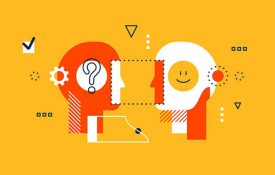-

New Research From Psychological Science
A sample of research exploring perceived weight discrimination and physiological dysregulation, fear conditioning, motor-memory consolidation, and infants’ learning to reach to the self.
-

Weaknesses in Emotion-Expression Research Outlined in New Report
Software that purportedly reads emotions in faces is being deployed or tested for surveillance, hiring, market research, and more. But a report in Psychological Science in the Public Interest finds that facial movements are an inexact gauge of a person’s feelings, behaviors or intentions.
-

Bottling the Symphonic Scents of Emotion
APS Past Board Member Gün R. Semin is exploring what he calls the “invisible orchestra” of bodily scents related to happiness, fear, and other emotional experiences.
-
For Kids With Anxiety, Parents Learn To Let Them Face Their Fears
The first time Jessica Calise can remember her 9-year-old son Joseph’s anxiety spiking was about a year ago, when he had to perform at a school concert. He said his stomach hurt and he might
-
Puerto Rico’s “Fear Lab” Mentors Neuroscience Rigor amid Diversity
A lineage of young neuroscientists from diverse backgrounds trace their scientific roots to a “fear lab” in Puerto Rico that the National Institutes of Health has been supporting for two decades. A crucible for studies
-
How Trauma Affects Memory: Scientists Weigh In On The Kavanaugh Hearing
In Thursday’s testimony at Judge Brett Kavanaugh’s confirmation hearings, Christine Blasey Ford alleged Kavanaugh sexually assaulted her at a party in 1982, when she was 15 years old and he was 17. Kavanaugh staunchly denied

